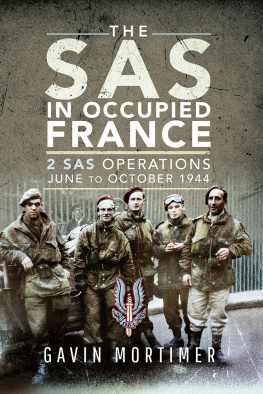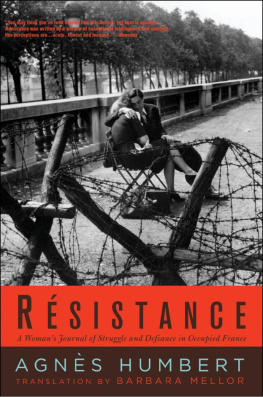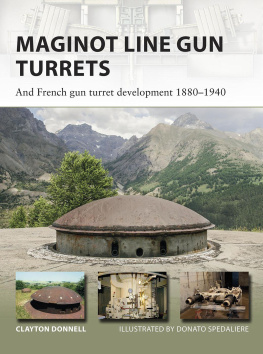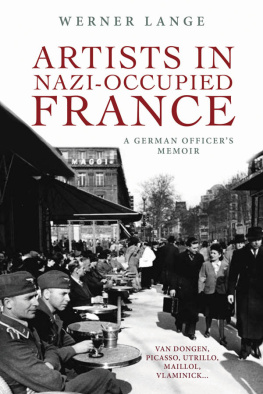
EUMENES Publishing 2019, all rights reserved. No part of this publication may be reproduced, stored in a retrieval system or transmitted by any means, electrical, mechanical or otherwise without the written permission of the copyright holder.
Publishers Note
Although in most cases we have retained the Authors original spelling and grammar to authentically reproduce the work of the Author and the original intent of such material, some additional notes and clarifications have been added for the modern readers benefit.
We have also made every effort to include all maps and illustrations of the original edition the limitations of formatting do not allow of including larger maps, we will upload as many of these maps as possible.
UNCENSORED FRANCE
AN EYEWITNESS ACCOUNT OF FRANCE UNDER THE OCCUPATION
By
ROY P. PORTER
Former Associated Press Correspondent in France
Uncensored France was originally published in 1942 by The Dial Press, New York.
* * *
To F. I. P.
With sincere appreciation to two
Associated Press colleagues for their assistance:
John Evans, Foreign Editor,
Fred Vanderschmidt, Cable Editor.
TABLE OF CONTENTS
Contents
TABLE OF CONTENTS
REQUEST FROM THE PUBLISHER
FOREWORD
Roy P. Porter
It was, indeed, fortunate for the American public that the Associated Press sent Roy Porter to Occupied France as its correspondent. For Roy Porter, with his down-to-earth American outlook and his talent for digging up not merely official hand-outs but the much more important uncensored news, is ideally fitted to interpret for American readers the story of the German occupation of conquered France.
Roy Porter is thirty-four. He has been a newspaper reporter since 1927 and has worked in Chicago, Los Angeles, Des Moines, New York, London, Berlin, Prague and Danzig. Ever since December 12, 1932 he has been affiliated exclusively with the Associated Press, for whom he covered all types of foreign news. In May, 1937 he was assigned to the Paris Bureau and remained there until he returned to the United States several months ago. He has scored many news beats but as he himself remarks: It was only when I returned to the United States that I realized how few of the really important stories from occupied territories got through the German censorship office without being garbled in transmission. In this book I have written, for the first time, as I wanted, and I have reported all that I have seen accurately.
Mr. Porter is married (his wife was with him in France during a portion of his stay there), and he is the father of a three-year-old son who was born in Paris. He likes to swim, swings a mean hand at black jack, and claims that his hobby happens to be, strangely enough, writing for the papers. His chief prejudice is people who ask: Is it really so bad in Europe?
AUTHORS NOTE
Uncensored France covers the period from the beginning of the German occupation, June 14, 1940, to November 14, 1941, when the author returned to the United States. All of the incidents related are true, although the identities of a number of persons, mostly Frenchmen who are still in the occupied zone, have been disguised for obvious reasons.
ROY P. PORTER
New York City
February 15, 1942
CHAPTER ONE Bastards
Je men f, said the Frenchman, but you dont have to be so damned nasty about it, just because you bastards won the war.
The German set down his glass. Through tightened lips he asked: Did you say bastards?
I did, acknowledged the Frenchman. Tell me, what part of Germany are you from?
The Rhineland.
In this war, where did most of your best fighters against Francethose magnificent young men of 19 and 20come from?
The Rhineland.
Only one more question, then, sir, the Frenchman said. Didnt French soldiers occupy the Rhineland 19 and 20 years ago?
Then the German hit him.
CHAPTER TWO Victory for the Nazis
Pierre Laval spoke. I hope to God that the Germans smash the hell out of the British until they leave only a grease spot. Then, perhaps, France can take her proper place in European affairs without British domination. He banged his fist down on the desk so hard that my cigarette fell off the ash tray. It was the close of the historic interview in mid-October, 1940, when officials first let it be known that France was for collaboration with Germany. Her premier said so for publication. Two days later he was off to talk to Adolf Hitler and tell him the same thing. Two days after that Ptain added his approval.
With an Associated Press colleague, I had gone to see Laval. We had waited for hours in the gaudy reception room of the Hotel Matignon, where French premiers have their office.
One by one, deputies, senators, chiselers, and friends had passed before us into the office where Laval held forth. From time to time, when an usher left the door open for a few seconds, his voice, nervous, anxious, startling, drifted out. But the chief was busy with his own affairs. Not even his secretary could do anything for us. He sent out word he would be glad to see us when he got around to it. We waited.
Eventually we were summoned. Through a haze of cigarette smoke we saw a stocky, greasy-faced little man behind the desk. He arose, gave us each a limp hand and said curtly, Sit down.
His disregard for usual French politeness was abrupt. There was none of the How do you do, I hope you are well, its nice weather were having, thank you too, greeting so usual in life in France.
Laval said, Sit down, and he meant only that.
Monsieur le Prsident, I started out, I wonder if you could give us an indication of Frances future policy that I could try to explain to America.
Laval sneered and smiledat the same time.
What do you want me to say? he asked. What can any country like your own want to hear from a conquered nation under the domination of an army of occupation? Do you want me to tell you the truth or do you want me to make a fool of myself for your benefit? We want to know, I said, what you are planning for France. We are interested because America and France have always been friends. We want to know because we hope to continue to be friends.
All right, you asked for it, he responded, placatingly. If you dont like it, stop me....Heres what were trying to do. We believe theres only one way for Franceand that way is with Germany. Is it our armys fault that we were beaten in the war? No.
Is it the Germans fault? No. The fault lies in the stupid and blundering governments which have ruined France in the last twenty years. And now, whether they like it or not, the French people have to learn to do as they are toldor take the consequences.
Laval explained his position. He reviewed lengthily his career as a supporter of French-German-Italian rapprochement. He cited his speeches, his writings, his arguments, public and private.
What then do you think of England and America? I said when the torrent of words died down. Do you blame England for Frances defeat?
My God, yes! he exclaimed. Were the French willing to fight against the Germans, whom they knew to be ten times stronger? Were the French ready to fight anybody after the Popular Front, with all its lying and thieving, got through with its mass robbery? Have you seen anything in France since the war started like the national spirit in 1914?...You have not. And you wont. Everybody is too damned disgusted with whats happened, and too damned disgusted with why it happened. And now were going to change all thatand do it on a new pattern.









